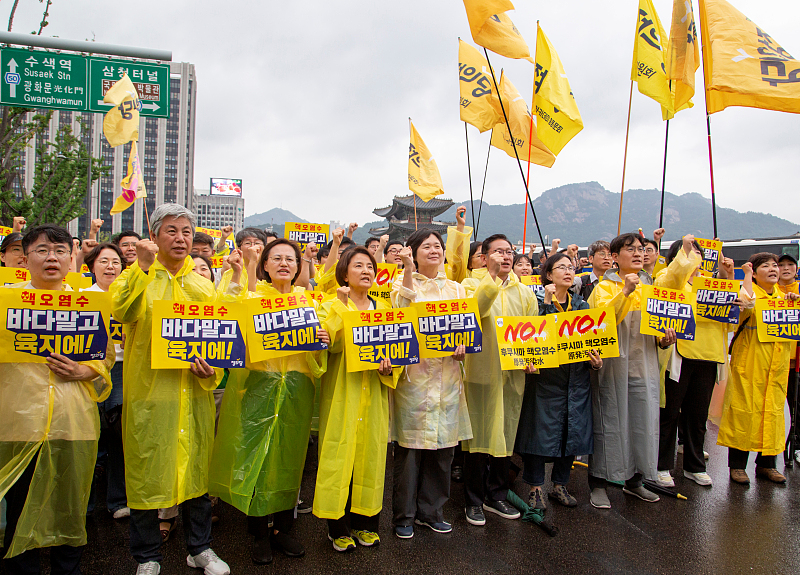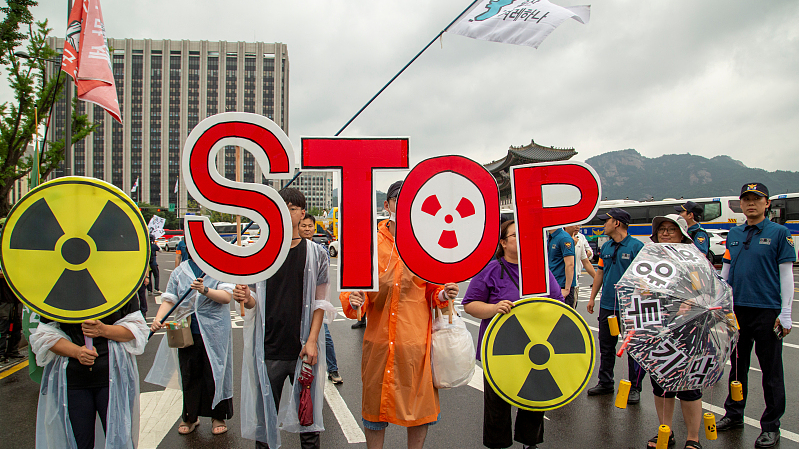
People protest against Japan's plan to release its nuclear-contaminated water into the Pacific Ocean, in Seoul, South Korea, July 15, 2023. /CFP
People protest against Japan's plan to release its nuclear-contaminated water into the Pacific Ocean, in Seoul, South Korea, July 15, 2023. /CFP
South Korean fishermen on Friday held a maritime protest rally against Japan's planned discharge of contaminated wastewater from the crippled Fukushima Daiichi nuclear power plant into the ocean.
A group of local fishermen gathered on the seashore of the southwestern coastal county of Jangheung, carrying a rally called "flower bier" about 200 meters along the coast to protest against the contaminated water release plan.
"The flower bier is used for a (traditional) ritual to carry coffins when people die. We marched with the flower bier to say that if the Fukushima nuclear wastewater is released into the ocean, all humankind will die," said Kim Young-chul, executive chief of the Federation of Korean Fishermen's Associations.
The placard of "oppose discharging Fukushima nuclear contaminated water" was attached to both sides of the bier carried by the fishermen, Kim said.
The same placards were also hung on the sides of about 30 fishing boats that staged a maritime demonstration in waters off the county for some half an hour.
"I'd like to ask questions to the Japanese government. Why is it seeking to release the contaminated water into the ocean if the water is really safe as Japan claimed? Why is it seeking to dump it through a one-kilometer-long tunnel after dilution if the water is safe enough to drink?" said Kim.
He noted that if it is a really safe and edible water, Japan can just choose to use it inside its territory for agricultural, industrial and drinking purposes.
Japan has been pushing for dumping the contaminated wastewater this summer from the Fukushima Daiichi nuclear power plant, which was hit by a massive earthquake and an ensuing tsunami in March 2011.

People protest against Japan's plan to release its nuclear-contaminated water into the Pacific Ocean, in Seoul, South Korea, July 15, 2023. /CFP
People protest against Japan's plan to release its nuclear-contaminated water into the Pacific Ocean, in Seoul, South Korea, July 15, 2023. /CFP
Growing anger, fears about the immeasurable impacts
The move has aroused strong opposition and doubts from domestic fishing groups, neighboring countries and the South Pacific island countries, as well as the international community.
A fishing organization in Indonesia has recently expressed concern over Japan's plan to discharge nuclear-contaminated water into the ocean.
The chairman of Indonesian Traditional Fishers' Union (KNTI) told media outlets that the Japanese government must realize that its plan will have an impact on the marine environment and public health, which will also be bad for the economy in fish-producing countries.
KNTI is a traditional fishing organization in Indonesia that advocates for the interests of traditional fishermen and the protection of the ocean ecosystem.
According to a German marine scientific research institute, with the world's strongest currents along the coast of Fukushima, radioactive materials could spread to most of the Pacific Ocean within 57 days from the date of discharge, and reach all global oceans in a decade.
"There are at least 60 kinds of radioactive elements in the Fukushima's nuclear wastewater and the impacts on human health caused by the plan is immeasurable," Zhang Yanqiang, professor of international law at Dalian Maritime University and director of the Institute for Yellow Sea and Bohai Studies, told CGTN in a recent interview.
He said that Japan's unilateral decision to release the wastewater into the ocean is extremely irresponsible.
"It should be decided by the international law, such as the United Nations Convention on the Law of the Sea and the Convention on the Prevention of Marine Pollution by Dumping of Wastes and Other Matter in 1972. However, Japan's discharge plan has not been authorized by any relevant law and rules," the expert noted.
(With input from agencies)